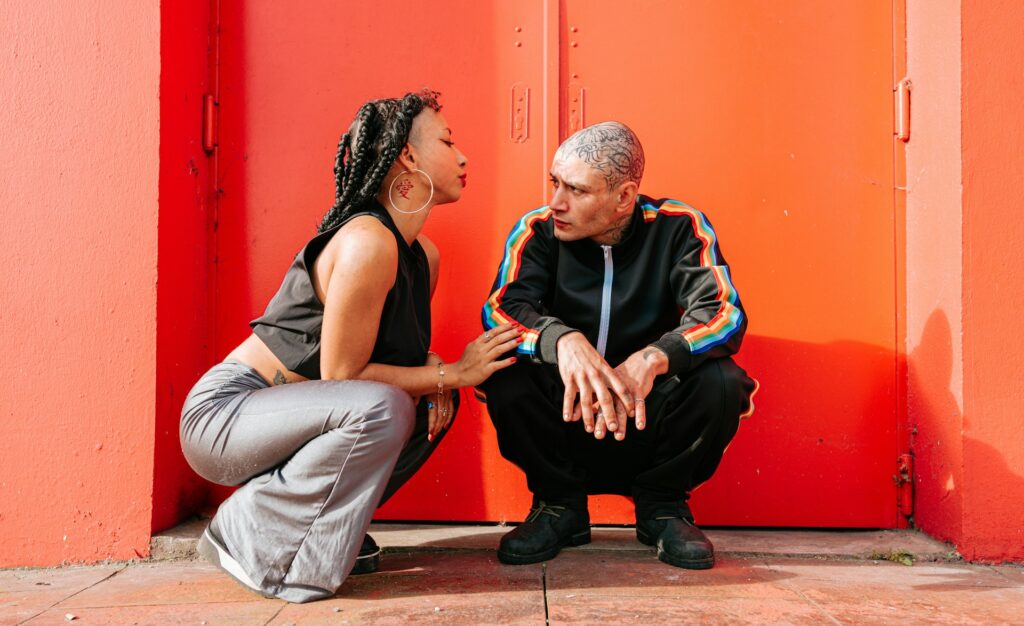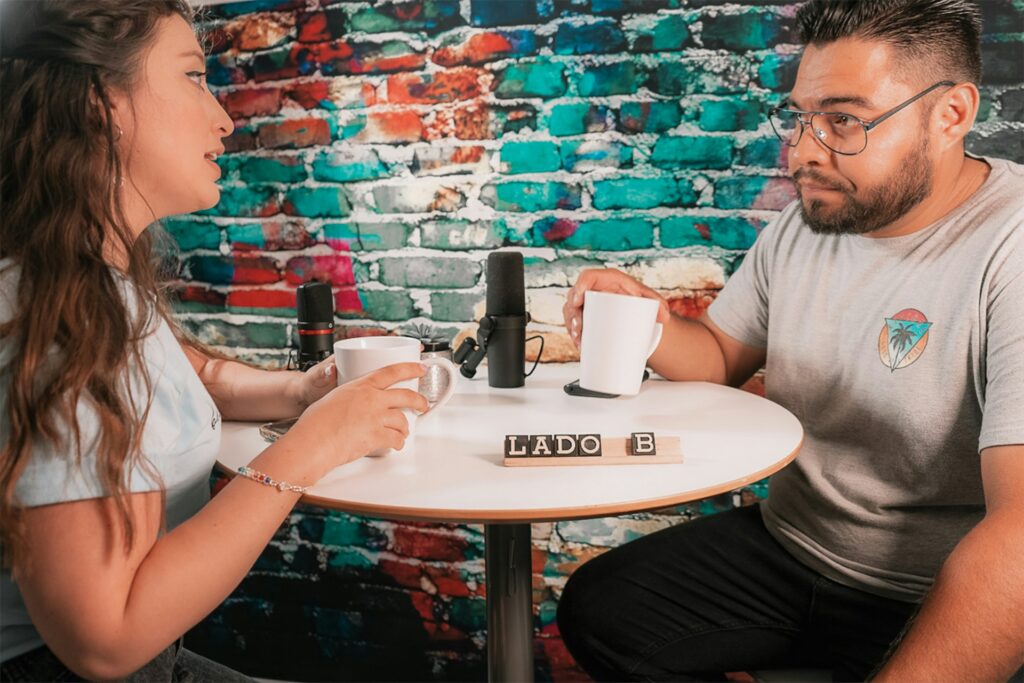Most people mean well when they’re trying to comfort someone with anxiety.

However, some things, even if said from a caring place, can make things worse rather than better. After all, anxiety is much more than just feeling nervous or stressed. It can affect a person’s body, thoughts, and daily functioning in overwhelming ways. So, when someone is already trying to stay grounded, the wrong words can add a fresh wave of shame or disconnection. If you want to show up for someone in a way that actually helps, here are the kinds of phrases to avoid—and what to try instead.
1. “Just calm down.”

This one feels like a slap, even when it’s meant to help. If calming down were an option in the moment, they’d already be doing it. Telling someone to calm down makes it sound like they’re choosing to feel anxious, which they’re not—it’s more like their body has hit the panic button and the brain is scrambling to keep up.
What helps more is calm presence. Something like, “You’re safe right now, and I’m here with you.” That actually opens the door to calming down, rather than demanding it.
2. “It’s all in your head.”

This phrase can make a person feel like what they’re experiencing isn’t real or valid. Sure, anxiety is rooted in the brain, but the fear, the nausea, the chest tightness, the racing thoughts—they’re all very physical and exhausting. Instead of brushing it off, try something like, “That sounds really tough. Want to talk about it or just sit quietly for a bit?” That kind of response validates the experience without minimising it.
3. “You’re overreacting.”

This instantly tells someone their emotional reaction is too big or inappropriate. But anxiety isn’t about logic—it’s a survival mechanism, and sometimes it gets triggered even when there’s no actual danger. If someone’s reacting strongly, it’s because something feels unsafe to them. You don’t have to understand it to respect it. Try saying, “It’s okay to feel what you’re feeling. I’m not going anywhere.”
4. “Other people have it worse.”

It might be meant to offer perspective, but this phrase only adds guilt. Now, the person not only feels anxious—they feel bad for feeling bad. That’s not perspective, that’s piling on more weight. Everyone’s pain is personal. You can acknowledge someone else’s struggle without invalidating your own, and that goes both ways. Stick with something more human, like, “You matter too. This still deserves care.”
5. “You need to stop thinking about it.”

This one sounds like helpful advice, but it’s often impossible to follow. Anxious thoughts are like noisy neighbours—they don’t leave just because you ask nicely. Telling someone to stop thinking often backfires and makes them feel like they’re failing to manage their own brain. A better route? Suggest doing something together that calmly changes focus: “Want to go for a walk or do something light together?” Redirection works better than resistance.
6. “You’re being dramatic.”

Being told you’re dramatic when your body feels like it’s in danger is deeply invalidating. Anxiety can involve crying, shaking, or needing to escape a space quickly—it’s not about attention-seeking, it’s about trying to regulate overwhelming sensations. Try showing some grounding empathy instead: “It’s okay to feel this way. Let’s figure out what helps you right now.”
7. “Just breathe.”

While breathwork can help with anxiety, barking “just breathe” at someone in distress usually has the opposite effect. It puts pressure on them to perform calmness when their system is in survival mode. Instead, offer a steadying presence: “Let’s slow our breath together. Follow mine if it helps.” That makes it less about fixing and more about support.
8. “Why are you anxious?”

This might come from curiosity, but it can feel like a challenge. The truth is, anxiety doesn’t always have a clear reason—it can creep in during perfectly normal moments and spiral without warning. If you want to help, don’t ask for explanations. Just offer presence: “It’s okay not to know why. What would feel comforting right now?”
9. “You were fine a minute ago.”

Anxiety can flip the switch fast. One minute someone’s laughing; the next, their heart is pounding for reasons they can’t explain. Pointing out the change can make them feel unstable or judged. Focus on support, not confusion. Say something like, “It’s okay—however you’re feeling now, I’m with you in it.” That matters more than understanding the timeline.
10. “You’re always anxious.”

This one stings because it turns a health issue into a character flaw. Being told you’re “always” anxious can feel like you’re being reduced to your symptoms, as if nothing else about you matters. A better way to acknowledge the pattern is with compassion: “I know this happens sometimes, but you’re not alone in it. You’re more than this moment.”
11. “Snap out of it.”

This phrase carries impatience, like anxiety is a bad habit that can be shaken off with enough willpower. But mental health doesn’t work that way. Snapping out of it isn’t a choice—it’s a process. Try a softer alternative: “Let’s take this one step at a time. You’re not expected to be okay instantly.”
12. “You’re making everyone uncomfortable.”

This comment can shut someone down completely. It tells them their struggle is too visible, too messy, and now a burden to other people. It feeds the exact fear anxiety thrives on—being too much. Instead, protect their dignity. A quiet, kind “Want to take a breather together?” can offer an escape without embarrassment.
13. “It’s not that serious.”

Even if something seems small to you, it might feel huge to someone with anxiety. Dismissing it as “not serious” tells them they’re overblowing things, when in reality their nervous system is just stuck in high alert. Validate first, problem-solve later. “I can see this is really affecting you—let’s figure out what helps,” lands a lot better.
14. “You need to toughen up.”

This reinforces the unhelpful idea that sensitivity equals weakness. However, surviving with anxiety takes serious strength. Facing daily life with an overactive stress response is hard, and it takes guts to keep showing up anyway. Respect that quiet resilience instead of challenging it. Say, “You’re doing better than you think. I see how hard you’re trying.”
15. “I get anxious too, but I don’t act like this.”

This one builds a wall instead of a bridge. Everyone’s anxiety looks different. Just because someone else manages theirs differently doesn’t mean they’re doing it better, or that the other person is doing it wrong. Instead, try something more open: “I’ve felt it too, but I know it hits everyone differently. I’m not judging—just here if you need me.”
16. “You just need to be more positive.”

Positivity can be helpful, but forced positivity shuts people down. It makes them feel like they’re failing at optimism, when what they actually need is space to be real. Telling someone to “just be positive” makes it sound like they’re choosing the dark when they’re really just trying to survive it. Choose presence over pressure. “You don’t have to pretend you’re okay for me” is one of the kindest things you can say.


